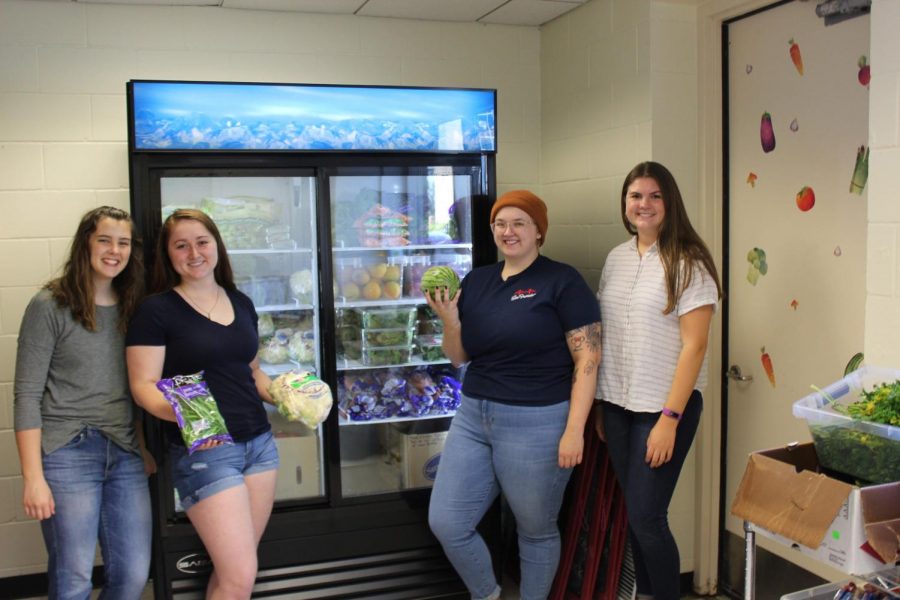Groceries galore for the food-insecure
Feed Your Brain opens a permanent food shelf on campus.
Volunteers Maggie Burns, Mary Anthony, Alexa Clausen, and Emma Kiley ready to help people coming to the pantry.
October 2, 2019
Since 2017, student organization Feed Your Brain (FYB) had coordinated monthly pop-up pantries for food-insecure Pipers. Now, those days are gone — because as of Sept. 25, FYB has achieved their goal of establishing a permanent, refrigerated campus food shelf.
“I see applesauce,” junior Liz Peterson remarked as she walked into the Food Resource Center (FRC) on opening day. “I haven’t had applesauce in a while.”
Peterson credits the pop-ups for supplying her with groceries at times when money was tight. Now, she can peruse every week rather than just once a month.
Located at the Walker Fieldhouse loading docks, the FRC is open on Wednesdays and Thursdays from 11 a.m. to 1 p.m. and again from 4 to 6 p.m.
“This really all started when Feed Your Brain started,” Campus Food Access AmeriCorps VISTA and FYB co-founder Emma Kiley ‘19 said. “We’ve put a lot of work into making [the FRC] a reality.”
Funded by a unanimously-passed HUSC resolution, the refrigeration unit’s installation cost $3,100. Local nonprofits The Food Group and Twin Cities Food Justice help FYB stock the pantry.
Fun Fun, agency relations specialist for The Food Group, believes the FRC is evidence of growing awareness of hunger on college campuses.
“What I noticed when I started working at The Food Group was that there were a number of college food pantries that were… our partners,” Fun said.
Additionally, several colleges that are currently without pantries have recently contacted The Food Group about starting one.
“It’s not all that common, still, to find a food pantry at a college, but it’s getting more and more so,” Fun said.
Kiley hopes that the FRC will make food more accessible for students with dietary constraints.
“We are trying to be more intentional about getting food that is allergy-sensitive, like gluten-free pasta,” Kiley said. “That kind of stuff’s harder to come by and it’s also more expensive, so we really appreciate it when people donate.”
Kiley and FYB are also seeking guidance regarding religious dietary restrictions.
“We just need to hear more information from students about what they want here. We can’t really make guesses about what a certain religion or culture would like,” Kiley said.
The groups most at-risk for food insecurity are students of color, low-income students, Muslim students, transgender students and chronically ill or disabled students, per analysis of FYB’s 2018 Food Access Survey.
“Surveys help us know who is affected and how many are impacted, but not why,” Professor Susi Keefe, FYB’s adviser, said. “A goal [is] to conduct qualitative research, focus groups, with these students… to determine how best to address their specific needs.”
FYB plans to recruit students for the focus groups, which will be coordinated through an interdisciplinary “collaborative class” combining four courses, including Keefe’s Public Health senior seminar. The class is designed for enrollees to engage in community-centered research with local partners, including FYB.
“Food isn’t always seen as a basic human right,” Kiley said. “At its core, [the FRC] is needs-based. It’s not free food for the whole campus, but it’s on an honor system. If a student feels like they could benefit… we’re not going to stop them.”

